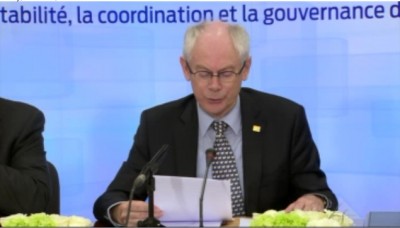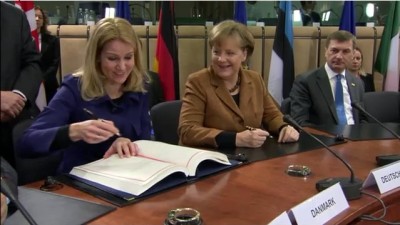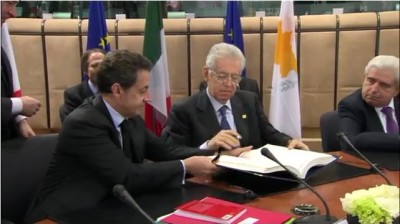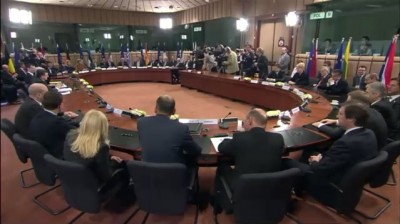 newsitems
newsitems  New Treaty on €uro-Area Governance creates specific Summits for Economic and Other issues
New Treaty on €uro-Area Governance creates specific Summits for Economic and Other issues
New Treaty on €uro-Area Governance creates specific Summits for Economic and Other issues

The Governance of €uroarea (GEA), consisting of Regular Heads of State/Government Summits, due to discuss and decide both on Economic and "Other issues" concerning them, will permanently incorporate also the President of the Central European Bank, and (in order to associate EU Citizens closer and regularly), it will also create a "Conference of Representatives" from MEPs and National MPs from the 17+ Member Countries' involved, ... entering into force on January 2013, or even earlier, if at least 12 (out of the 17) €uroarea Countries ratify it beforehand.
Thus, even if one or two, among the 17 €uroArea Countries might, eventually, hesitate to immediately ratify the Treaty, (and/or if, f.ex., controversial Socialist candidate to French Presidential Elections, Hollande, threatens to re-negotiate its text : Somehing which was criticized by various key players, including from Germany : See, f.ex. Reply of Finance Minister Schaüble to "EuroFora"s question, etc), then, a Majority of the Counties who signed the Treaty will not be blocked, nor delayed at all, but can go on and make it enter into force without having to wait. A any case, "the granting of financial assistance in the framework of .. the European Stability Mechanism will be conditional... on the ratification of this Treaty by the (State) concerned", €uroTreaty warns.

Simply reading the Finaly agreed, full authentic Text makes it obvious that, in addition to the Economic Governance tools that "EuroFora" has already highlighted earlier, (See f.ex. our relevant NewsReports from the Franco-German Summit, Sarkozy-Merkel, of August 16th, and from EU Brussels' Summits of December 2011, as well as January 2012, etc), "it's also about bringing a closer Political integration" in €uroArea, as German Chancellor Angie Merkel observed from the outset at her concluding Press Conference, in a statement which would certainly please President Nicolas Sarkozy, given France's well known preference to stress mainly Political aspects in european developments, (comp. also Replies by Sarkozy's Counselor to "EuroFora"s relevant question in Brussels' Jan. 2012 EU Summit), ...
In particular, the New, 2012 €uroArea Treaty states from the outset that it's not only about Financial "Stability", but also about "Coordination and Governance".
- "Heads of State or Government of the €uro area Member States agreed on 9 December 2011 on a Reinforced Architecture", it reminds,
This is not only in order "to work Jointly towards an Economic Policy", since the signatory States must "develop ever-closer Coordination of economic policies within the €uro area", (particularly on "the Issues that are Essential to fostering Competitiveness", as "identified" by the "Euro Plus Pact", already endorsed by Heads of State/Government "on March 2011"), but also in order to became able to "take the necessary actions and measures in all the areas which are essential to the proper functioning of the €uro area", as it adds.
Indeed, "foster Budgetary Discipline through a Fiscal Compact", and "strengthen the Coordination of .. Economic Policies"; goes hand to hand with the Wider "purpose" to "improve the Governance of €uroArea", the Treaty's "scope" observes.
This naturally includes the already existing "EU's Objectives for sustainable Growth, Employment, Competitiveness and Social Cohesion", but is not limited just into that.
"In particular", it "notes" "the the wish of the Contracting Parties to make a more active use of Enhanced Cooperation", as provided for by EU's Lisbon Treaty, (which entered into force since December 2009), "and their wish to have full recourse to Measures Specific to the Member States whose currency is the €uro".
For that purpose, it recalls "the Agreement the Heads of State or Government of the €uro area Member States, of 26 October 2011, to improve (its) Governance ...including (by)holding ..at least 2 Euro-Summit(s) .. per Year", (i.e. at least each 6 Months).
Such "€uro-Summits" of Heads of State/Government may be convened not only "immediately after meetings of EU Council", but also after "meetings (of) ...all Contracting Parties having ratified this Treaty" on €uroArea, as well as whenever it might be "justified by Exceptional Circumstances", adds the official text, clearly revealing the Autonomy of such important €uro-events at Top Political level.
They "take the necessary actions and Measures in All the areas which are Essential to the proper functioning of the €uro Area", (including "Growth through enhanced Convergence and Competitiveness, .. Employment, ... Sustainability of Public Finances and reinforcing Financial Stability", etc).
For that purpose, the Countries involved, "stand Ready to make active use,....of Measures Specific to those Member States whose currency is the €uro", "and of Enhanced Cooperation", "..on matters that are Essential for the proper functioning of the €uro area"
------------------------
Under the Heading : - "Governance of the €uroArea", the Chapter V of the New Treaty anounces that "the Heads of State or Government of the Contracting Parties whose currency is the €uro shall meet informally in Euro Summit meetings".
€uro-Summits "shall take place ... at least Twice a Year", and "when(ever) Necessary", (i.e., they might become, in practice, even More Frequent than he Summits of the 27 EU Members States sharing together the Single Market)..

>>> For their Political dimensionn, it's important to note that, according to the New Treaty, €uro-Summits are due "to discuss" not only "questions relating to ..Specific responsibilities .. with regard to the Single Currency", "and Strategic Orientations for the conduct of Economic Policies to increase Convergence", but also "Other Issues concerning the Governance of €uroArea".
The 2012 Treaty also adds that Heads of State/Government will "meet ... together with the President of the EU Commission", and introduces an important innovation by setting the New Principle that also "the President of the European Central Bank shall be invited to take part" always.
This novelty, (which adopts for ever the initial decision of €uroArea's Heads of State/Government to invite CEB's President Draghi at the December 2011 Brussels' Summit, fits with recent developments consisting into allowing the CEB to start playing an important new role in the protection of €uroArea, f.ex. with 2 massive moves to offer succesively 488 and 539 Billions € for Loans with only 1% interest rate for 3 Years to Banks in Europe on 12/2011 and 2/2012, which already contributed into ensuring enough Liquidities for Economic Investments and for Sovereign Bonds, (See specific "EuroFora"s NewsReport, herewith).
----------------------------------------------
Catching up with the delayed "Missing Link"...
----------------------------------------------------------

ECB's new, active role in €uroArea's Governance (See supra) had been already prepared by the Historic, "Compromise of Strasbourg", when the 3 Biggest €uroArea Countries : Germany, France and Italy, had decided, at an exceptional Merkel - Sarkozy - Monti Summit, end of November 2011, to "avoid unilateral declarations for or against ECB's independent decisions", which was closely followed by the 1st ever participation of ECB's President Draghi to the December 2011 EU Summit in Brussels, (as "EuroFora" had observed in EU Parliament's Press Conferencies, later on in Strasbourg : See relevant 12/2012 publications). But, in fact, there was already a strong "Feeling floating in the air" in this direction, as early as since the landmark August 16th, exceptional Franco-German Summit Sarkozy - Merkel at the Elysée Palace in Paris, i.e. precisely when the Idea to create "regular €uroArea Summits" was anounced for the 1st time, (See "EuroFora"s NewsReports from Paris/Elysée palace, then).
In fact, such institutional developments had been politically scheduled already by the Historic Fathers of the €uro Currency : - "European People will start revolting and ask to create a Governance of the €uroArea", since most Tools traditionaly used by Keynesianist reforms in order to overcome the cyclic Crisis, (f.ex. State Budget's Deficit, absorbed by Monetary creation and/or Public Debt, Fiscal policy, etc), had been transfered from the National States up to a €uropean Level", (mainly ECB itself) : This was, indeed, a leitmotiv in EU Parliament Plenary's landmark Debates, as early as since October 1995 in Strasbourg, when MEPs, EU Commission, EU Council and even UNO's leaders had dissussed "Europe's Future"....
So that after the Economic Reforms for the creation of €uro Currency entered into force, back since 1999, followed (according to the Schuman theory for the edification of Europe "step by step") by Political, Institutional Reforms contained in the Referendum for EU's "'Constitution"' (2005), then, the EU was practically ready to start a New, Fresh round of Negotiations for the "Missing" Reform due to create an €uroArea"s Governance, long BEFORE the 2008-2009 Global Crisis, which would have been able to prevent, alleviate, better face and sooner overcome the USA-imported upheaval.
But, as it's well known, the attempt by some fomer "Socialist" Governments to impose the controversial and unpopular Turkey's EU bid since 1999, provoked strong reactions by EU Citizens, which resulted to an unprecedented Majority Abstention in EU Parliament Elections and 3 "No"' to EuroReferenda during that "Dark" period of EU - Turkey so-called "Accession Negotiations between 1999/2000-2005, practically Blocking EU's Institutional/Political Reforms and Europe's development for many Years...
Until French President Sarkozy's crystal-clear "No" to Turkey's controversial and unpopular EU bid, strengtherned also by German Chancellor Merkel's "No" since 10/2005 and mainly 9/2009, added to the Debates and Results of the latest, June 2009 EU Parliament's Elections, (See "EuroFora"s analysis and cited Facts), followed even by more National Elections' results in a similar direction afrerwards, up to 2010/2011, notoriusly made it possible to overcome that Blockade, rapidly prepare and start working with New EU Institutions (thanks to the "Lisbon Treaty"), from December 2009-January 2010 until now.
Meanwhile, however, the USA-imported Global Crisis had hit also Europe, from the end of 2008 - beginning of 2009, which was, then, found Unprepared, contary to the initial Plan of the Historic "Fathers" who had created the "Euro" Currency back in the 1990ies (See supra). So that the Franco-Gertman couple Sarkozy-Merkel and their €uroZone allies from other Member Countries, had to hastily try to start building up from scratch the obviously necessary €uroZone's Governance DURING the Global Crisis, and particularly on the "occasion" of the huge Debt provoked by previous Financial and Political Errors to Greece, which "exploded" between 2009-2012, (aggravated, also, by an obvious exploitation by some hypocritical, in fact Anti-European networks).
But Now, even this (in fact, artificially provoked problem) seems ready to be fixed soon, at least as a matter of urgency, as most players and observers expect during this Month of March 2012, and both President Sarkozy as well as Chancellor Merkel, echoed by EU President Van Rompuy and EU Commission's President Barroro, as well as the competent EU Commissioner Oli Rehn and even new EU Parliament's President Martin Schulz, (etc), have just declared.
-------------------------------------------------
On the contrary, "the President of the European Parliament may be invited to be heard", if the €uro-Summit decides so, MEPs being regularly informed by "a Report to the European Parliament after each Euro Summit meeting".
But, a brand New "Conference of representatives of the relevant committees of the EU Parliament and ...of National Parliaments", wil be "organized" in order to "Discuss .. Issues covered by this (€uroArea Governance) Treaty", i.e. on "Budgetary.. and Other" policies.
The creation of this New Institutional Tool "will" be "determined together" by "EU Parliament and the National Parliaments" of Member States.
---------------
"The body charged with the preparation of and follow up to the €uro-Summit meetings shall be the €uro Group", composed by Finance Ministers, (and not EU Commission, nor EU Council),
On the highly controversial issue of the level of participation of Non-€uroArea Countries, members of the EU, which signed the 2012 Treaty on EAG, the text says that their "Heads of State/Government .. shall participate in Discussions (i.e. without Vote) of €uroSummit(s) .. concerning Competitiveness, ... Modifications of the Global Architecture of €uroArea, and the Fundamental Rules that will apply to it in the Future, as well as ... on Specific Issues", "at least Once per Year", (i.e. not always) : Another incitment to hurry up their accession into €uroZone...
Main Menu
Home Press Deontology/Ethics 2009 Innovation Year EU endorses EuroFora's idea Multi-Lingual FORUM Subscribers/Donors FAQs Advanced search EuroFora supports Seabird newsitems In Brief European Headquarters' MAPs CoE Journalists Protection PlatformBRIEF NEWS
- 00:00 - 02.06.2021
- 00:00 - 18.10.2020
- 00:00 - 19.06.2020
- 00:00 - 18.05.2020
- 00:00 - 20.04.2020
- 00:00 - 02.02.2020
- 00:00 - 09.12.2019
- 00:00 - 27.11.2019
- 00:00 - 16.11.2019
Popular
- Yes, we could have prevented Ferguson riots says World Democracy Forum's Young American NGO to ERFRA
- Spanish People Elect CenterRIGHT Majority with 1st Party and Total of 178 MPs (6 More than the Left)
- Pflimlin's vision
- The European Athletic "Dream Team", after Barcelona 2010 Sport Championship Results
- Source Conseil d'Europe à ERFRA: Debatre Liberté d'Opposants à Loi livrant Mariage+Enfants à Homos ?
- Head of BioEthics InterGroup, MEP Peter Liese : "Embryonic stem cell research reaching its END" !?
- Spain: Jailed Turkish Terror suspect with Explosive,Drones,Chechen accomplices stirs Merah+ Burgas ?
- UN Head Ban Ki Moon at CoE World Democracy Forum : - "Listen to the People !"
Latest News
- Test Photos (f.ex.+ Invit to EU + Korea Peace meeting)
- EUOmbudsmen Conference 2022: Digital Gaps affect People's Trust threaten EF Project on EU Future ?
- French Election : Black Out on Virus, but Obligation for Fake 'Vaccines" Challenged
- Both French Presidential Candidates point at "Humanism" in crucial times...
- France : Zemmour = Outsider may become Game Changer in Presidential + Parliamentary Elections 2022
Statistics
Lankytojai: 59836614Archive
Login Form
Other Menu

The incoming Swedish EU Presidency (July-December 2009) may still remain in favour of Turkey's controversial EU bid, despite June 2009 EU Elections' results, but it has "very strong demands on Turkey"'s obligation to respect EU Rules, said the Head of Swedish Foreign Ministry's Press Service, Cecilia Julin, to "EuroFora", reacting to critical Press reports.
- "I know (that) the link is often made also to Sweden's position on Turkey"'s controversial EU bid. Indeed, "we (Swedish EU Presidency) are very much engaged in the future membership of Turkey, but not without fullfiling all the Criteria".
- "It's very clear that we (Swedish EU Presidecny) have very Strong Demands on Turkey, in a sort of concept for Future membership of the Union, ...which will be a Long Process...", she stressed.
This means, in particular, "the Copenhagen Criteria (on Human Rights, Democracy and Rule of Law), and also the adaptation to the Acquis of the European Union".
- "If you listen to what Mr. Bildt (the Swedish Foreign Minister) says on Turkey at different occasions, it's very clear : We want Turkey to become part of the Union, in the Future. But we want it to fullfil all the Criteria : The Acquis of the European Union. That's very clear", she concluded.
The Senior Official of the Swedish Foreign Ministry was reacting to critical Press Reports, from Brussels' Journalists invited by EU Commission's secretariat to Stockholm, who claimed that Bildt was abusing of a ..."Whip" (sic !) against Cyprus, by "threatening" the presence of UNO's Peace-keeping force at the "Green line" which separates the island's Government-controlled areas from the territories occupied by Ankara's army, if Nicosia didn't accept any political solution, regardless of Turkey's demands, before the end of 2009.
Governing AKEL Party's new Secretary General, Andros Kyprianou, reacted by declaring that no-one can threat the People of Cyprus : -"We shall decide for our Future, and nobody else", he reportedly said, asking to "keep calm". "In order to find a Solution soon, certain basic Principles must be respected", he stressed, calling those who feel an urgency to use their influence on Turkey. Other Political Parties were more critical.
This was a reference to recently reported statements by Turkish Minister Bagis, Prime Minister Tayip Erdogan and Turkey's National Security Council (a Military-Political body), accused to push towards a partitionist "2 States" solution, contrary to UNO SC Resolutions for Cyprus' reunification.
December 2009 is a crucial moment for EU's appraisal of Turkey's controversial EU bid, because EU Council has decided to review then Ankara's compliance with the European position on the recognition of Cyprus' Government, which was clearly set out by an EU reply of 21 September 2005 to Turkish Prime Minister Tayip Erdogan's claims, refusing to recognize even the existence of EU Member Cyprus, in controversial statements he made to London (former EU chair) on July 29, 2005.
EU Parliament's latest Resolution on Turkey, adopted on March 2009 in Strasbourg, warned Ankara that "the non-fulfillment of Turkey's commitments... by December 2009, may further seriously affect the process of Negotiations" with the EU.
In practice, the issue boils down to Ankara's "embargo" against Ships and Airplanes using Cyprus' seaports or airports at the strategic EU island, which traditionaly hosts one of the World's biggest Shipping flags. EU has already "freezed" 6 relevant Chapters in EU - Turkey Negotiations since December 2006, after Ankara refused to fullfil a commitment it had undertaken when EU had decided to open controversial "accession" negotiations with Turkey, back on December 2005.
- "As far as EU - Turkey relations are concerned, it's clear that Turkey needs to fullfil its obligation of full, non-discriminatory implementation of the additional Protocol (to "EC-Turkey Association Agreement"), This is an important issue....and should be addresseed as soon as possible as it clearly affects the pace of the accession negotiations.Issues covered by the Declaration of September 2005 will continue to be followed up, and progress is urgently awaited", warned earlier in Strasbourg the out-going Czech EU Presidency (former vice-Prime Minister Alexander Vodra).
But the Head of the Swedish Foreign Ministry's Press Service, Cecilia Julin, dismissed "interpretations" by "some" that Foreign Minister Carl Bildt was reportedly "threatening" Cyprus with consequences on the UNFICYP, if it doesn't accept any solution until December 2009, while Turkey is reportedly delaying in an attempt to impose a partitionist "2 States" solution.
On the contrary, Julin, stressed that "Sweden has strong demands on Turkey'"s respect of "Copenhagen Criteria and EU Acquis".
Meanwhile, Sweden is "concerned" about the risk of "Stalemate" in Cyprus' Talks, but is well aware that "the main responsibilities lie with the two leaders and the UNO", Europe playing only a role of "facilitator".
After carefully verifying, the Head of Swedish Foreign Ministry's Press Service, stressed to "EuroFora" that Bildt's reference to UNFICYP "was not linked to a Threat", and dismissed those who "interpreted" it so.
On the contrary, the Swedish EU Presidency acknowledged the fact that Peace Talks are mainly for the UN and the leaders of the Cypriot communities, EU's role being limited into that of a "facilitator".
As for Turkey's reported attempts to impose a "2 States' solution", the Head of the Swedish Foreign Ministry's Press Service sharply replied by stressing that Turkey must respect the "EU Acquis" rules.
In particular :
- "Basically he (Bildt) underlined that it's the leaders of the two communities in Cyprus and the UN that have the main responsibilities for solving the problem", started to say the Swedish Senior Official to "EuroFora", referring to the above-mentioned "briefing".
- "But the EU had a role in sort of pointing out the benefits and facilitating a little bit the outcome for the settlement of the whole Cyprus' issue", she added.
- "And he did state the Fact, that the rest of the World (i.e. USA, etc) will, of course, look at the differend issues which are at the table, and the future of the UN Peace keeping force is part of what is at the table", she admitted.
- "I understand that some have interpreted that as a Threat, by the Swedish Minister" "But", in reality, "it's a statement of a Fact, that, when we'll look at the differend issues, one of the issues on which we shall have to take a stand on, is the future of the UN Peace keeping force in Cyprus".
Indeed, one of the questions usually raised for a Solution of Cyprus' issue is what International and/or European or other Guarantees, by a Peace-keeping force, might be needed afterwards, eventually for a transitory period.
Questioned anew by "EuroFora" whether (according to critical Press Reports) this could be taken as a veiled warning that, if Cyprus didn't accept any Turkish demand for any solution whatever, it might be left alone to face Ankara's Military Invasion/Occupation, she denied :
- "He (Bildt) didn't say it in that way"... "It was not linked to a threat, or anything like that", the Head of the Swedish Foreign Ministry's Press Service stressed.
On the contrary, "he (Bildt) underlined that the main responsibility lies with the parties concerned on the island". "The EU can try to facilitate and show the benefits of reaching a settlement. But also, when the EU and the rest of the World (i.e. USA) will have to look at it, they will look at all the Facts on the table, and the presence of the UN Peace-keeping force is one".
And "he (Bildt) didn't speak about that at all", she replied to "EuroFora" question on Turkey's reported attemps to impose, in one way of another, a partitionist "2 States solution".
Asked whether Bildt's aim was to incite both parties to move forward efficiently, she agreed :
- In fact, "the EU is really very concerned with the Stalemate in the situation. Yes !", the Head of Sweden's Foreign Ministry's Press Service anounced. That's why Bildt "was hoping for the two parties (i.e. for Turkey's also) to engage and break, a little-bit, the present stalemate, come to a solution of the issue" of Cyprus.
But, replying to a "EuroFora"s question on the risk, denounced by several politicians in case of strict Time Deadlines, for Turkey to provoke a stalemate and wait for the time to come to impose a partitionist "2 States' solution", she reacted by pointing at Turkey's obligation to respect "EU Acquis" :
- "Turkey must fullfil the EU Acquis : That's clear !", the Swedish Senior Official stressed.
More details are expected when Swedish Prime Minister Reinfeldt will debate his Programme with new MEPs at EU Parliament's plenary mid-July in Strasbourg, that he has visited already in 2008.
Foreign Minister Carl Bildt became familiar with Strasbourg's CoE last year, when Sweden chaired the PanEuropean organization of Human Rights. As EU chairman-in-office, he will also chair the 27-member States strong EU Group inside the 47-member States strong CoE.
Minister for EU affairs, Cecilia Malmstrom is well known at EU Parliament, where she has been an active MEP of the Liberal Group for many years, following also Press Freedom issues.
Both have already made various statements at "EuroFora", on differend topical matters.


















